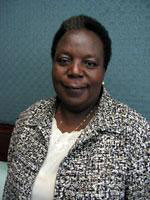
Gertrude Ibengwe Mongella, President of the Pan-African Parliament
Originally uploaded by Pan-African News Wire Photo File.
http://www.pan-african-parliament.org/index2.htm
The PAP was established in March 2004, by Article 17 of The Constitutive Act of the African Union, as one of the nine Organs provided for in the Treaty Establishing the African Economic Community signed in Abuja , Nigeria , in 1991.
The establishment of the Pan-African Parliament is informed by a vision to provide a common platform for African peoples and their grass-roots organizations to be more involved in discussions and decision-making on the problems and challenges facing the continent.
The seat of the Parliament is in Midrand, South Africa
The Pan-African Parliamentarians represent all the peoples of Africa. The ultimate aim of the Pan-African Parliament is to evolve into an institution with full legislative powers, whose members are elected by universal adult suffrage.
The objectives of the Pan-African Parliament are to:
Facilitate the effective implementation of the policies and objectives of the OAU/AEC and, ultimately, of the African Union;
Promote the principles of human rights and democracy in Africa;
Encourage good governance, transparency and accountability in Member States;
Familiarize the peoples of Africa with the objectives and policies aimed at integrating the African continent within the framework of the establishment of the African Union;
Promote peace, security and stability;
Contribute to a more prosperous future for the people of Africa by promoting collective self-reliance and economic recovery;
Facilitate cooperation and development in Africa
Strengthen Continental solidarity and build a sense of common destiny among the peoples of Africa;
Facilitate cooperation among Regional Economic Communities and their Parliamentary fora.
Powers of Parliament
Examine, discuss or express an opinion on any matter, either on its own initiative or at the request of the Assembly or other policy organs and make any recommendations it may deem fit relating to, inter alia, matters pertaining to respect of human rights, the consolidation of democratic institutions and the culture of democracy, as well as the promotion good governance and the rule of law.
Discuss its budget and the budget of the Community and make recommendations theron prior to its approval by the Assembly.
Work towards the harmonisation or co-ordination of the laws of the Member State.
Make recommendations aimed at contributing to the attainment of the objectives of the OAU/AEC and draw attention to the challenges facing the integration process in Africa as well as the strategies for dealing with them.
Request officials of the OAU/AEC to attend its sessions, produce documents or assist in the discharge of its duties.
Promote the programmes and objectives of the OAU/AEC, in the constituencies of the Member States.
Promote the co-ordination and Harmonization of policies, mea sures, programmes and activities of the Regional Economic Communities and the parliamentary fora of Africa.
Adopt its Rules of Procedure, elect its own President and propose to the Council and the Assembly the size and nature of the support staff of the Pan-African Parliament.
Perform such other functions as it deems appropriate to achieve the objectives set out in Article 3 of the Protocol.
The PAP Protocol sets out the following relationship with African national and regional parliaments in Article 18.
No comments:
Post a Comment